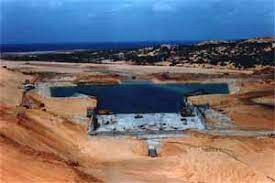
The country’s agriculture ministry earlier introduced a quota system for potable water and banned its use in agriculture until Sept. 30, as the country battles with a drought that is now in its fourth year.
SONEDE said in a statement that the water will be cut off daily from 9 p.m. until 4 a.m., with immediate effect.
Mosbah Hlali, its head, said the drought in the country was unprecedented due to the scarcity of rain for four consecutive years and called on Tunisians to understand the decision which it attributed to climate change.
Tunisia recorded a drop in its dam capacity to around 1 billion cubic meters, or 30% of the maximum, senior agriculture ministry official Hamadi Habib said.
The agriculture ministry has also banned the use of potable water to wash cars, water green areas and clean streets and public places. Violators face a fine and imprisonment for a period of between six days to six months.
Residents said Tunisian authorities have been cutting off drinking water at night in some areas of the capital and other cities for the last two weeks in a bid to cut consumption, a move that has sparked widespread anger.
The new decision threatens to fuel social tension in a country whose people suffer from poor public services, high inflation and a weak economy.
The Sidi Salem Dam in the north of the country, a key provider of drinking water to several regions, has declined to only 16% of its maximum capacity of 580 million cubic meters, official figures showed.
Tunisia’s grain harvest will be “disastrous”, with the drought-hit crop declining to 200,000-250,000 tonnes this year from 750,000 tonnes in 2022, senior farmers union official Mohamed Rjaibia told Reuters on Thursday.



